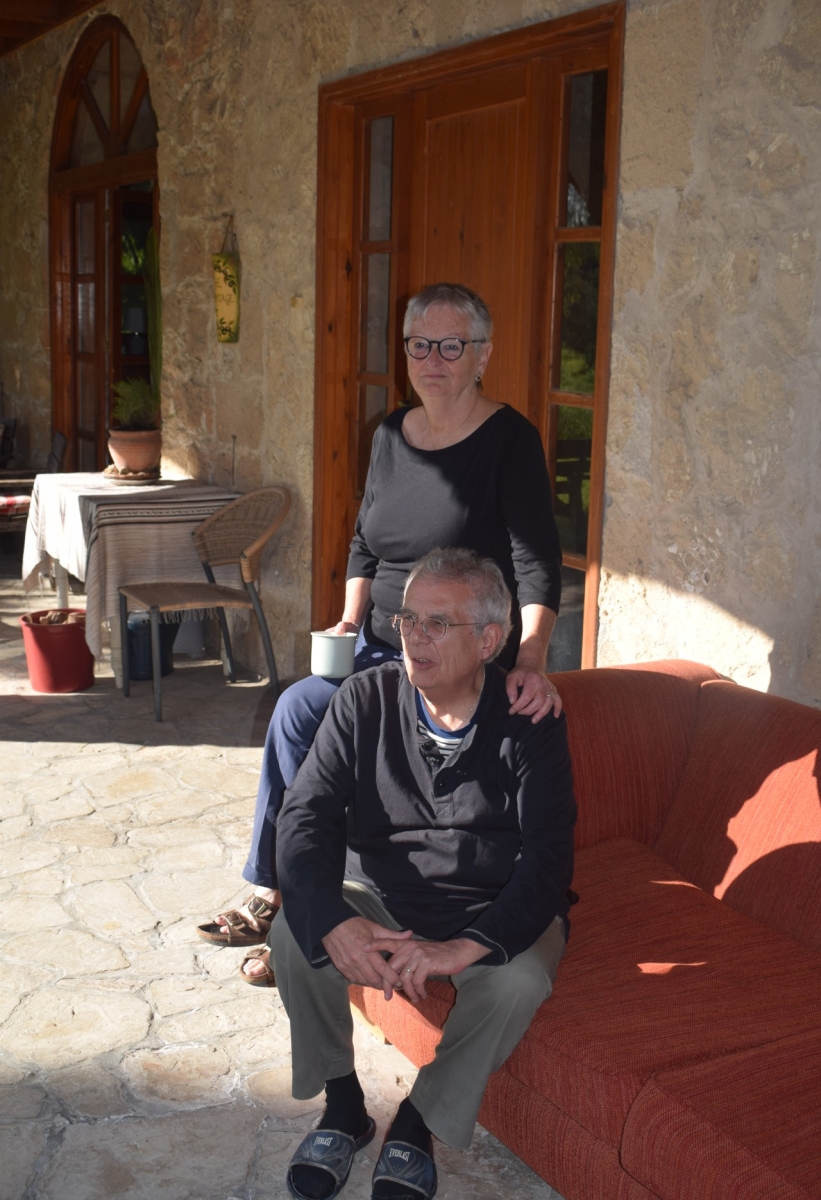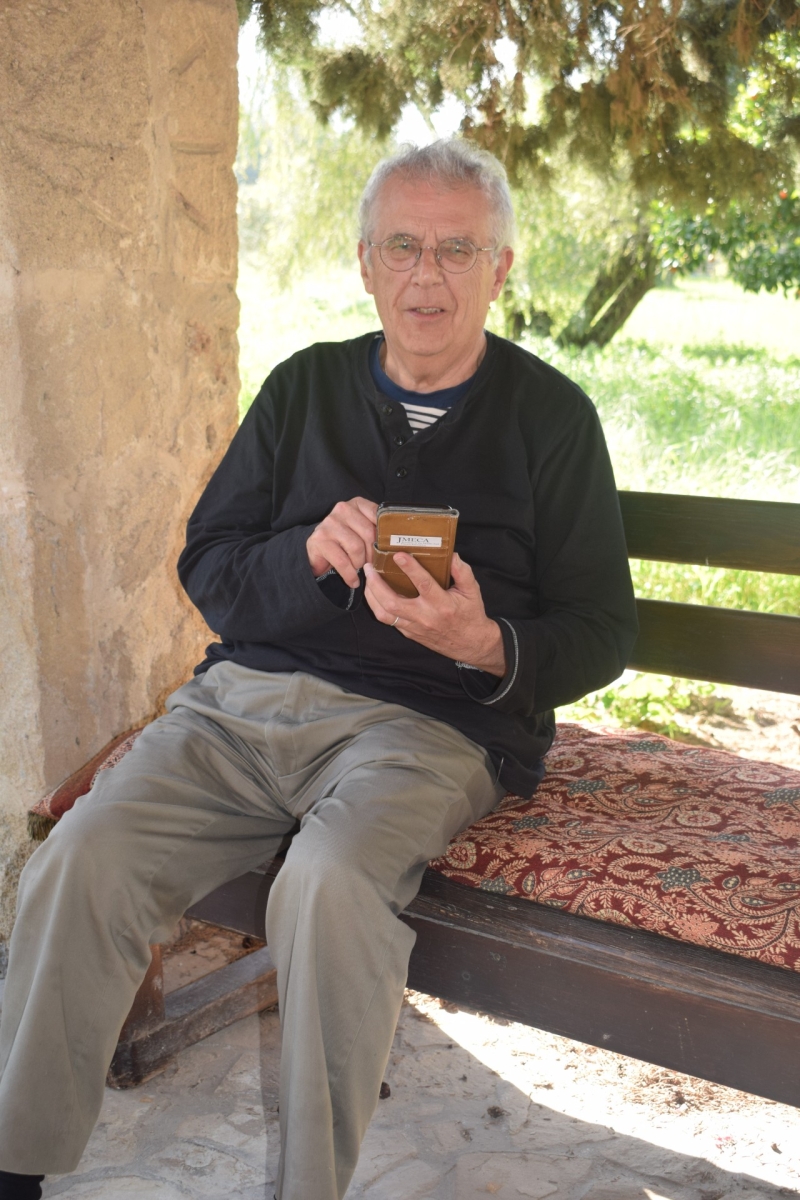The Rev’d Alec Mitchell is settling in well to his new house for duty post in Kyrenia – and what a house!
He and his wife Linda met apologies about housing when they showed interest in the post and were encouraged by Bishop Michael to apply. Bishop Michael had been Alec’s area bishop in the Diocese of Manchester from which he had recently retired. The Hermitage, home for Chaplains for generations, was said by the wardens to be uninhabitable. But thanks to commitment from JMECA/JEMT it has now been fully restored and Alec and Linda are delighted.
We’re loving it
Both Alec and Linda were born in Essex, Alec within a strict Baptist family. In fact, they were ‘Rechabites,’ an order founded as part of the Temperance movement in early Victorian times, based on Biblical injunctions to the grandson of Rechab that he should drink no wine. It was not this Biblical injunction which directed Alec’s life, however, but rather his “conversion” (as he describes it) to pacifism, on the brink of his joining the RAF. Subsequently he trained as Baptist Minister in Manchester (under the renowned New Testament scholar F.F.Bruce), an area which was to be his home for most of the rest of his life.
He was fortunate to be able to spend a semester at the World Council of Churches Centre at Bossey in Switzerland and was exposed there to some of the foremost European scholars of the day. His experience there confirmed in him a very strong sense of ecumenism, which has characterized his ministry. He returned to ordained Baptist ministry in Moss Side, Manchester, which he served for twenty-two years. Moss Side is an extremely economically deprived area of the city and was subject to the kind of unrest that infected other cities during the eighties. St Paul’s in Bristol, Toxteth in Liverpool and Brixton in London are names synonymous with riot, police discrimination, racism and drug dealing. Alec jokes that people in Moss Side couldn’t afford to actually buy drugs. They just supplied them to posh people from Cheshire! But this context of diversity, unemployment, violence, crime and the sense that society as a whole had given up on such areas, was the chosen context for his ministry.
He describes it as an ideal setting for ecumenical cooperation. Officially, his Church was in a partnership with the United Reformed Church, but outside official channels there was the kind of informal relationship between ministers that can often result from sharing situations of suffering. Together with others he went to Morning Prayer every day in the Anglican church, along with the Roman Catholic priest and they also worshipped together in the local convent. Out of this situation there grew a vocation to Anglican ministry and in 1999 he prepared for that at the College of the Resurrection in Mirfield, which experience has influenced his church practice.
He returned to ministry in the Anglican Diocese of Manchester, within the area overseen by Bishop Michael, who appointed him to a new post as Racial Justice Officer. This gave him opportunity to provide racial awareness training and also brought him into closer contact with people of other faiths. A further appointment came as ‘Borough Dean,’ the then Diocesan bishop’s idea to have an interface between the religious and secular worlds.
Reflecting on those years of ministry in Manchester, what are the things that he is most proud of being part of? One, certainly was ‘The Hideaway,’ which is what they called a youth project that provided a safe space for young people to meet in the basement of the Baptist Chapel in Moss Side. The project continues and was recently visited by Prince William. His opportunity to open discussions in the justice role, about such issues as the Middle East conflict, he also treasures. He helped to found the Broad Alliance of Radical Baptists (BARB), which he chaired for a number of years and which attracted a remarkable range of speakers to their meetings and conferences. Meeting the theologian Jurgen Moltmann from the airport on the way to the Swanwick Conference Centre, he asked him if he had been there before, and got the answer , “Yes, as a POW.” It was an Internment Camp during the war. Other speakers at various times and places included scholars such as D.S. Russell (a name that will be familiar to Old Testament scholars), and public figures such as Shirley Williams and Tony Benn. He well remembers Tony Benn’s ‘Five Questions to ask Those in Power.”

It comes as no surprise then that he met his wife Linda through a CND group. He describes her as a great partner in all he has done. She was Chair of the Management Committee of The Hideaway, and he remembers fondly a fund-raising event at which she had baked a cake in the form of a cruise missile and organised a ‘guess the weight of the cruise missile’ competition. A career teacher and former assistant head at an outstanding school, Linda was a Greenham Common woman (let the reader understand) and they proudly still carry with them a piece of the fence!
They had been to Kyrenia on holiday and found it ‘beautiful but chaotic.’ That, and the connection with Bishop Michael led them to this new three-year appointment. Alec is hoping it will give him time to pursue a part time research degree he is currently studying for through Bangor University, on modern fundamentalism, including a special focus on gender issues, and issues around antisemitisim and Zionism. Reflecting on the present situation in Gaza he says he fears
we are heading towards something awful that makes me desperately sad.
 They never expected to find themselves in Kyrenia but like so many of our ministers they sensed ‘an adventure.’ Alec’s guiding principle has always been to have a strong sense of God’s providence, but with a realistic vision. Quoting his former College Principal and mentor, Michael Taylor he adds:
They never expected to find themselves in Kyrenia but like so many of our ministers they sensed ‘an adventure.’ Alec’s guiding principle has always been to have a strong sense of God’s providence, but with a realistic vision. Quoting his former College Principal and mentor, Michael Taylor he adds:
and you should never ask God to do things we should do for ourselves.
Kyrenia, you have been warned!
Posted 2nd March 2024
